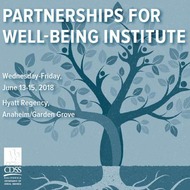D11 Motivational Interviewing for the Child Welfare Worker; Part 1
(View Complete Item Description)Motivational Interviewing (MI) is an evidence-based conversational method that helps promote behavior change in youth and adults. MI is used in diverse behavioral health and primary care settings to engage clients in change; and providers are finding important applications for this powerful approach. The child welfare system has found MI useful for engaging in change conversations; and MI is has been effective in working with pre-teens; adolescents; emerging adults and adults in the child welfare system. MI can be used in a number of child welfare settings; including differential response teams; schools; criminal justice environments; foster/kinship care; behavioral health centers and others. In this workshop; the central motivational interviewing concepts will be reviewed; and participants will have opportunities to practice discrete and powerful interventions that demonstrate important concepts of the model.
Material Type: Lecture Notes




















